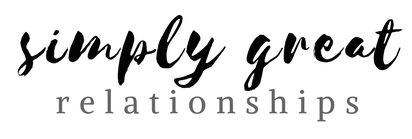You know when you see your partner doing something that you know isn’t good for them? Or there is an easier way to do it? Or a better way?
Approaching that type of conversation can be tricky. One wrong “you” and you’re in the role of criticizer. (Hint: criticism invites defensiveness).
Here’s the thing…
You wouldn’t be suggesting your partner do something differently unless it affected you.
You really wouldn’t.
We know this can be a tough one to accept, but it’s true. Your ability to identify how your partner’s particular action affects you is crucial because the way to communicate with them on this is by using “I” instead of “you.”
Consider this approach:
“You should really think about going food shopping on a weeknight, instead of Sunday morning. It’s less crowded and you’ll get it done faster. Plus, they restock more during the week. You take so long when you go on the weekend - it’s like half the day! And then you come home and have to put everything away. You should definitely skip tomorrow and go on Monday or Tuesday instead.”
The implied messaging here?
“You are dumb. You do not know how to do even the simplest of things - like food shopping - good enough for me. You need me to tell you what to do and how to do it. I don’t like the way you food shop. I am going to stand in my ivory tower and point out the things you’re doing wrong.”
We know that is NOT the message you intended to send. But, depending on the balance in your emotional bank account, that may be exactly what your partner is hearing. If their response is defensive (link: www.simplygreatrelationships.com/podcast/050), you know that’s what they heard.
Note the difference with “I” statements:
“I really enjoy spending time with you on the weekend, especially Sunday mornings. It’s so nice when we can cuddle in bed and have coffee together. That time is really special to me. Do you enjoy it too? I wondered if we might be able to plan for food shopping on a different day, so we can prioritize spending time together on Sundays. Would you be open to that? Is there any way I can help?”
The message here is:
“I like you so much that I want to spend more quality time with you. I enjoy when we’re together. It’s important to me and I want to make it a priority. Let’s collaborate to achieve that.”
Much better.
Challenge yourself to take radical responsibility for one week. Consider any negative feelings that come up in relation to your partner to live within you - in an unmet need or not communicated wish. Figure out what that need is and make the request of your partner using “I” statements. You are sure to see a significant decrease in defensiveness and actually get what you want!
Download this week’s FREE bonus - Are You A Constructive Critic? video training.
Disclaimer:
Silveron Productions LLC and Nassau Wellness Marriage and Family Therapy PLLC do not hold itself out to be your psychologist, psychiatrist, psychotherapist, or social worker. Our content is provided for informational and educational purposes only and is not to be perceived or relied upon as medical or mental health advice, diagnosis or treatment. Do not use our content in lieu of professional advice given by qualified medical and mental health care professionals and do not disregard professional medical or mental health care advice or delay seeking professional advice because of information you have received from us. Always seek the advice of your physician or other qualified mental health provider with any questions you may have regarding a medical condition or mental disorder. If you think you may have a medical or mental health emergency, call your professional caregiver or 911 immediately. We do not recommend or endorse any specific tests, physicians, psychologists, psychiatrists, psychotherapists, social workers, products, procedures, opinions, or other information that may be mentioned in our content. By viewing our content, you acknowledge and agree that the following warnings and disclaimers apply to all of our content and agree to indemnify and hold Nassau Wellness and all content participants for any and all losses, injuries, and damages resulting from any and all claims that may arise from your use or misuse of the content.
By viewing our content, you further acknowledge that you are doing so voluntarily and at your own risk, and that you are solely and personally responsible for your choices, actions, and results, now and in the future. You accept full responsibility for the consequences of your use or non-use of any information provided in our content. Nassau Wellness is not liable for any advice or information provided in our content, all of which is provided on an “as-is” basis. No warranties, either express or implied, are made regarding the information we provide, and Nassau Wellness makes no representations about the accuracy or the suitability of our content. Opinions and other statements expressed by third-parties are theirs alone.


